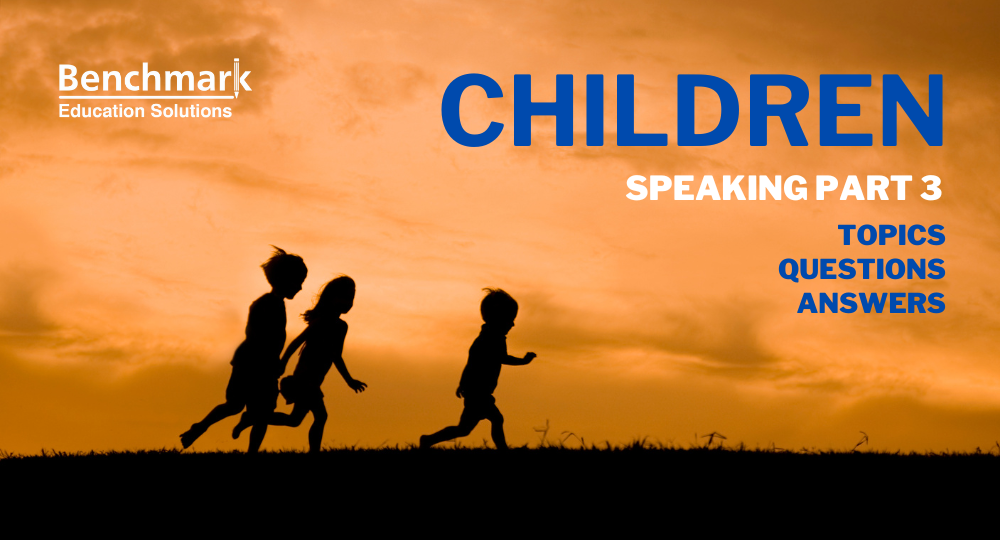Children IELTS Speaking Part 3 Cue Card Questions with Answers
- 0 Comments

Children is a follow-up speaking topic that often comes up in the IELTS speaking part 3. Below you will find a list of some exam questions and answers that you could encounter during part 3 of the IELTS Speaking test.
The questions below are based on the real IELTS speaking exam. They serve as a great IELTS Speaking part 3 prediction questions to help you prepare better before your test.
Children Speaking Part 3 – Discussion 1
- When are parents proud of their children?I think parents are proud when their children pass the milestones of growing up. For example, taking their first steps, starting school, learning to drive and graduating. Parents look as proud as punch when they see their children succeed. I think they are also proud when children do something kind or generous.
- What makes them proud?I think, in truth, they are proud of their children’s abilities but also proud of themselves for bringing up a kind, successful human. Parents like to show off that their child is good at something as it reflects on them. That sounds a bit cynical but I think it’s natural.
- Should children who do something positive get a reward?Not every time but good behavior should be rewarded. For example, good grades at school should be recognised with a gift or some pocket money. However, it is not a good idea to reward a child everytime they clean their bedroom or eat all their dinner as then they will expect it in the future.
- When do adults feel proud of themselves?I think it is similar. They feel proud when they achieve something in life like a promotion, buying a new car or winning a competition. Feeling proud is about being the best you can be. Also, adults can feel proud when they are recognised by others and complimented. Praise makes people feel good about themselves.
Children Vocabulary Speaking Part 3 – Discussion 1
- as proud as punch – very proud
- to show off – to show other people what you are proud of
- praise – give compliments
Other IELTS Speaking Part 3 Topics
Here are other common topics that you could come across during the IELTS Speaking Part 3 test.
Discussion 2
- What are some other games that children play indoors?There are a lot of board games that ca be played, like ‘Scattegories’, ‘Dominoes’, and ‘Sorry!’. I remember playing that game a lot as a child, with both my family and my friends. Many children also play with Lego. It’s a really fun and stimulating way to keep busy.
- Do you think there is a difference between boys’ and girls’ games?I think that society encourages certain games for specific genders. A lot of games destined for girls come in pink or purple packaging, while boys’ toys come in blues or darker colours. Many girls play dress up or kitchen games, while boys are often given cars and action figures.
- Should there be different games for different genders?I am an opponent of gender stereotypes, and I therefore do not believe genders should be targeted with separate games. Children are unaware of genders, but have likes and dislikes. Conditioning them to play ‘gender-appropriate’ games may prevent them from becoming their true selves, also leading to more divided societies.
- Do you think it is better for children to play with their parents or with their friends?I believe that both are important. It is essential that children have a strong bond with their parents in their youth, so they get all the care they need for a healthy development. However, playing with friends is equally important for developing social skills and easier integration later in life.
Vocabulary for Discussion 2
- stimulating = encouraging interest and enthusiasm
- destined for = designed for
- gender stereotypes = specific values, attitudes, belief and assumptions that are attributed to and are different for men and women
- conditioning = training someone to behave or think in a particular way
- prevent = keep something from happening
- social skills = ability to interact, share and coexist with others
- Integration = becoming part of a group, a community or a culture
Discussion 3
- Who expresses themselves better, children or adults?I think very young children express themselves better than adults as they don´t have the same inhibitions so if they feel something they express it straightaway. Children are generally more honest and this helps them to get over problems. Adults tend to keep their emotions inside, which isn’t really healthy.
- Should we encourage adults to learn from children how to express their feelings?Adults should be encouraged to express their feelings but maybe not in the same way as children. Children have tantrums and this would be unacceptable from an adult who needs to behave more reasonably and patiently. Adults need to learn negotiation skills.
- Is it helpful to express our feelings?In my opinion, it is helpful because if our emotions build up they can lead to stress and even mental health issues. Talking with a close friend or relative can help to relieve stress if you feel overwhelmed. Most people find it difficult to do but in the end it is useful.
- Why do some people refuse to express their feelings?That is a difficult question but I think that some people want to make an impression on others and don’t want to show any weakness. This can lead to them keeping problems to themselves and trying to cope with stress without support. I think a problem shared is a problem halved so it is not a good idea to clam up when it comes to feelings.
- Why do employers employ people who are empathic to other people’s feelings?If somebody is going to work in a customer facing job or management it is very important to be sensitive to other people’s feelings. The customer or worker will be able to approach this person which makes the service better overall. Also, an understanding colleague is valuable in the workplace.
- How can employers assess if somebody is empathic?If they are an effective interviewer they should be able to tell during the interview. Some questions or situations are designed to test empathy and if somebody is sensitive to others, for example, do they respond only about the business objectives or their personal feelings or do they consider others.
- Is it good to make choices determined by emotions?It depends, there are two types of people; those who think with their head and those who think with their heart. I think decisions are best considered by the head but it is easier said than done and most people are affected by emotions. Whether they are the right decisions I am not so sure.
Vocabulary for Discussion 3
- get over – to recover from a problem, situation
- tantrums – uncontrolled anger
- overwhelmed – full of emotion
- clam up – don´t speak
- easier said than done – easy to say, difficult to do
Discussion 4
- Are children more open than grownups?It is a tricky comparison. Children like to share what happened to them during the day, and they try to capture people’s attention when they do certain activities. Nonetheless, adults can be very open as well, although about different topics, which are sometimes too complex for children to understand.
- How can we encourage children to express their feelings effectively?Children may sometimes express certain strong feelings, such as pain, in hostile ways. Talking to them calmly about the situation and their feelings is primordial. It can help them feel heard and understand themselves, so they can think twice before they act in a similar situation in the future.
- Can people ever be too open?In some cases, yes. Some people may share information that is too personal or intimate. It is particularly uncomfortable when an acquaintance lets the cat out of the bag when talking about other people’s personal lives. While it is important to share feelings and thoughts, I believe there is a time and place for everything.
- Should adults talk more about their feelings?I believe they should. I think that, for many people, becoming adults means they need to be emotionally stable and resilient. However, that is not a realistic expectation. Sometimes life is simply difficult, and getting any negative feelings out of our systems through talking to people can be highly beneficial.
Vocabulary for Discussion 4
- capture people’s attention = get people’s attention, make sure people listen or pay attention to you
- hostile = violent
- think twice = think before you act so you can choose the best response to a given situation
- lets the cat out of the bag = tells a secret
- there is a time and place for = certain actions are only appropriate in certain situations
- getting (something) out of our systems = letting out or expressing any negative thoughts, feelings or energies, so you can move on
Discussion 5
- Who do you feel you can get along with better, teenagers or children?I think that I get along more easily with teenagers. I feel I am able to connect with them and understand their world better. While there may be bumps along the road with some attitudes or reactions from them which may hinder communication, I feel I can get them best.
- How do teenagers treat the elderly in your country?As with most relationships, this depends on individual circumstances. Some teenagers have a close-knit relationship with their elders, while others do not have the same rapport, and may not always act respectfully around them. It is very dependent individual cases and families.
- Do you think teenagers behave better today than they did in the past?I think that more emphasis has been placed on encouraging respectful behaviour in school, with anti-bullying policies. They may not always be effective, and there are still many issues with cyberbullying, and verbal and physical violence, but, overall, I feel teenagers’ behaviours are more controlled.
- What are the main differences between teenagers and older people?The older I grow, the blurrier the line gets. Perhaps the main difference I notice is the level of energy that tends to be higher in younger people than in the elderly. Behaviour-wise, particularly in terms of lack of flexibility in some people, I feel some teenagers and older people are quite similar.
Vocabulary for Discussion 5
- bumps along the road = some obstacles
- get = (in this case) understand
- close-knit = very close
- rapport = relationship
- anti-bullying policies = measures put in place to prevent and respond to bullying
- cyberbullying = bullying that takes place online (e.g. through social media)
- the blurrier the line gets = it is harder to see any difference at all

